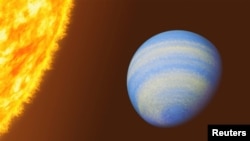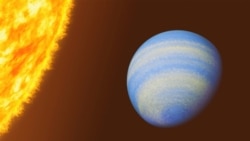Scientists say they have found evidence that the smelly molecule hydrogen sulfide exists in the atmosphere of a Jupiter-like planet. Hydrogen sulfide is the chemical compound that gives rotten eggs their bad smell.
The planet is called HD 189733b. It is an exoplanet, a term used to describe planets that exist outside of our own solar system. It was discovered in 2005.
Scientists had already identified similarities between HD 189733b and Jupiter, the oldest and largest planet in our solar system. But the exoplanet was previously not thought to hold hydrogen sulfide.
Astronomers who study this gas giant have said it is deep blue in color and that severe conditions exist in the atmosphere.
It has winds that can blow up to two kilometers per second. The exoplanet is believed to reach temperatures up to 930 degrees Celsius on the side facing the star that it orbits. Scientists also say it rains glass, which can be blown by fierce winds.
The weather on HD 189733b is so extreme, the American space agency NASA once described the planet as a “nightmare world.”
New observations by NASA’s James Webb Space Telescope suggest that this is the first exoplanet where hydrogen sulfide has been identified. Scientists say the discovery has helped give them a better understanding of this stormy world.
The finding was recently explained in a study appearing in the publication Nature.
One of the leaders of the research was astrophysicist Guangwei Fu of Johns Hopkins University in Maryland. He told Reuters, “This is not a planet we humans want to visit, but a valuable target for furthering our understanding of planetary science."
Fu said HD 189733b is known as a “hot Jupiter” planet. However, it orbits 170 times closer to its star than Jupiter does to the sun. It completes one orbit every two days. Jupiter takes about 12 years to orbit the sun.
Fu noted that hot Jupiters are not found often. "About less than one in 100 star systems have them," he said.
Fu said he thinks the newly discovered “stinky smell” just adds another interesting element to what is already known about the planet. It is 64 light-years from Earth, in the constellation Vulpecula. A light-year is the distance light travels in a year, about 9.5 trillion kilometers.
It is closer to Earth than many exoplanets. This makes it “bright and easy for detailed studies,” Fu said. He noted, for example, that hydrogen sulfide would have been much harder to find on planets that are further away.
The Webb telescope – which became operational in 2022 – is able to observe a wider range of radiation wavelengths than earlier telescopes. This permits more detailed examinations of exoplanet atmospheres.
"Our research finds that HD 189733b is more similar to Jupiter than previously known," said Arizona State University astrophysicist Luis Welbanks. He was a member of the research team. "This planet is very much like Jupiter, but just hotter."
Jupiter, too, has small amounts of hydrogen sulfide in its atmosphere. But the exoplanet is about 10 percent larger than Jupiter in diameter and mass.
The Webb observations also confirmed earlier evidence showing the exoplanet has water and carbon dioxide in its atmosphere.
"With these three molecules, we are able to count the amount of oxygen, carbon and sulfur the planet has,” Welbanks said. That information, he added, gives scientists a chance to learn more about how the planet may have formed. It should also provide data on whether it is different from planets in our solar system.
Welbanks said the scientists are clearly not searching for life on such a hot, harsh planet. However, he noted that understanding its atmosphere permits them to “understand how physics and chemistry behave under different environments and to begin to put together the 'recipe' for forming planets."
I’m Bryan Lynn.
Reuters reported this story. Bryan Lynn adapted the report for VOA Learning English.
___________________________________________
Words in This Story
rotten - adj. suffering from decay
nightmare – v. a frightening or unpleasant experience
stinky – adj. having or producing an unpleasant smell
constellation – adj. a group of stars that forms a particular shape in the sky and has been given a name
range –n. a series of numbers or values that include the highest and lowest
harsh – adj. unpleasant, unkind or more severe than is necessary
recipe – n. a set of instructions explaining how to prepare and cook food







Forum